

Annual Report 2024-2025



Annual Report 2024-2025

It is with great pride and enthusiasm that I step into the role of Chair of ICTC at this pivotal moment in the organization’s continued growth and evolution. As Canada navigates a rapidly changing technological and economic landscape, ICTC stands at the forefront of this transformation— uniquely positioned to drive critical conversations, inform forward-thinking policy, and implement impactful programs that strengthen Canada’s digital productivity and global competitiveness.
In an era defined by artificial intelligence, advanced technologies, and accelerated innovation, ICTC plays a central role in unlocking the opportunities of tomorrow. Through its research, programs, partnerships, and initiatives, ICTC not only enables economic resilience but also charts a path toward an inclusive and sustainable digital future for all Canadians.
A diverse economy is a strong economy. Embracing diversity, particularly advancing the role of women in technology and innovation, is not only a matter of equity but a catalyst for Canada's innovation agenda and AI readiness. By ensuring that diverse voices are empowered and engaged, we can better bridge the innovation gap and fully harness Canada’s potential in the digital era.
I would like to extend my heartfelt thanks to our Board of Directors, our valued partners, dedicated stakeholders, and the exceptional staff of ICTC. Your steadfast commitment and inspiring work are the driving force behind ICTC’s impact.
I look forward to working alongside you to build a more innovative, inclusive, and competitive Canada, one founded on digital trust, guided by practical pathways for progress, and anchored in diverse perspectives and equity-centred values.
Janet Lin Chair, Board of Directors ICTC

In an era defined by artificial intelligence, advanced technologies, and accelerated innovation, ICTC plays a central role in unlocking the opportunities of tomorrow.”
Janet Lin Chair, Board of Directors
As we reflect on another transformative year, it is evident that the landscape of technology, the economy, and the job market continues to evolve at an unprecedented pace. From accelerated digital adoption and the rise of artificial intelligence to shifting geopolitical dynamics and climate imperatives, the global context presents both new opportunities and critical challenges for Canada. Navigating these changes requires foresight, agility, and a commitment to sustainable growth. ICTC is proud to stand at the forefront of this national journey.
In 2024–2025, ICTC has made remarkable strides across its research, policy, and programmatic efforts. Our evidence-based research continues to be a trusted source of insight on emerging technologies, labour market trends, digital equity, and sustainability.
These insights have informed key public policies and enabled organizations to make strategic, future-ready decisions. At the same time, ICTC’s programs, spanning youth digital upskilling, worker reskilling, immigration, work-integrated learning, and employer innovation support, have directly impacted thousands of Canadians and businesses, equipping them with the skills and tools to thrive in the digital economy.
Throughout this year, ICTC has remained focused on its mission to support a resilient, innovative, and inclusive Canada. Our work has centred on catalyzing economic growth, enabling sustainable and competitive enterprises, nurturing the talent of tomorrow, and safeguarding our digital infrastructure. Above all, we continue to champion a shared digital future—one that is secure, prosperous, and inclusive, leaving no one behind.
None of this would be possible without the unwavering dedication and passion of the ICTC team, as well as the guidance of our esteemed Board of Directors. I extend my deepest gratitude to our staff, board members, partners, and stakeholders for an extraordinary year. Your continued support and belief in our mission inspire us every day as we build toward a stronger Canada.
Together, we are shaping the future.
Namir Anani President & CEO ICTC

Our work has centered on catalyzing economic growth, enabling sustainable and competitive enterprises, nurturing the talent of tomorrow, and safeguarding our digital infrastructure. Above all, we continue to champion a shared digital future—one that is secure, prosperous, and inclusive, leaving no one behind.”
Namir Anani President & CEO ICTC




The Information and Communications Technology Council (ICTC) is a neutral, not-for-profit national centre of expertise with the mission to strengthen Canada's digital advantage in the global economy.
ICTC strives to stay ahead of the curve as digital technologies rapidly advance and transform industries and society. For over 30 years, our goal has been to ensure that technology drives economic growth and innovation, and that Canada's workforce remains competitive on a global scale.
To achieve our mission, we work with a wide network of industry leaders, policymakers, and academic institutions, focusing on developing digital skills, technology adoption, and fostering innovation. Our work comprises forward-looking research, practical policy advice, and capacity-building solutions for individuals and businesses, delivered in both official languages to reach and empower communities across the country.
We support government and industry leaders in identifying current and future opportunities and developing strategies to unlock the full potential of the digital economy. We also help Canadians from all backgrounds acquire the skills they need to succeed in Canada’s economy, while helping businesses transform and enhance their competitiveness in today's and tomorrow's markets.


ICTC is driving national economic growth by equipping Canadians with in-demand digital skills, connecting businesses to top talent, and helping industries harness advanced technologies. ICTC supports thousands of employers and workers to innovate, scale operations, and respond to shifting market demands—ensuring Canada remains competitive in the global digital economy.
ICTC empowers businesses to innovate in ways that also advance Canada’s sustainability goals by pairing digital adoption with strategies for the green transition. From research on green–digital skills in supply chains to capacity-building programs that help businesses adopt efficient, climate-conscious technologies, ICTC enables organizations to grow while contributing to a net-zero, resourceresilient future.
ICTC is building a dynamic talent pipeline that spans K–12, post-secondary, international professionals, and entrepreneurs. Targeted programs and labour market intelligence develop digital fluency, foster innovation, and support career transitions— ensuring a steady supply of skilled workers and visionary business leaders who can shape Canada’s digital future.
Through hands-on training, national competitions, and professional upskilling, ICTC strengthens Canada’s cybersecurity capabilities and digital resilience from a growing array of threats. Programs prepare youth and professionals to meet growing cyber talent shortages while also equipping organizations to safeguard data, infrastructure, and trust in the digital economy.
EQUITABLE AND INCLUSIVE ECONOMY
ICTC advances diversity, equity, and inclusion in the digital economy by breaking down systemic barriers and opening opportunities to underrepresented groups. With 70% of program participants from equity-deserving communities, targeted initiatives foster inclusive innovation, ensuring that the benefits of digital transformation are shared broadly across Canada.



research and policy reports provided valuable insights and data to shape policy decisions, guide industry practices and inform educational and training programs.
40,001 business leaders equipped with foundational AI knowledge.
participants engaged in ICTC digital skills and employment programs.
93 Webinars
29,468 K-12 students across Canada participated in digital skills learning experiences.
79,078 17 events hosted by ICTC. 135 speaking engagements for ICTC staff at national and international conferences, summits, and roundtables. 61
4,195
2,082 educators engaged in new and emerging technology training.
823 1,252
429 international ICT professionals supported to access jobs in Canada’s digital economy. small and medium-sized businesses supported to fill open digital roles with skilled talent. women entrepreneurs supported to accelerate their digital enterprises.
601 227 postsecondary students placed in work integrated learning employment experiences.
mid-career professionals upskilled into high-demand technology occupations. businesses in the digital economy supported to diversify their leadership pipelines.
70% of ICTC program participants were from underrepresented groups.
12 Workshops
6 Networking Events
4 Conferences 15 Roundtables
2 Pitch Events
2 Career Fairs
1 National Competition


ANNUAL REPORT 2024-2025




ICTC Receives Partner Status at Global Forum on Cyber Expertise
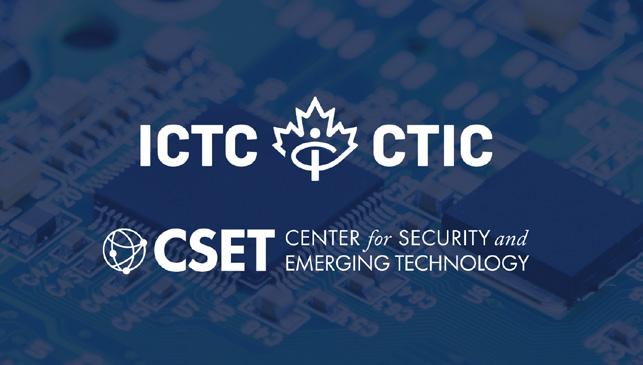
ICTC Partners with Georgetown’s CSET to Map Semiconductor Industries in Canada and the United States
ICTC Appoints Janet Lin as Chair of the Board of Directors

Advancing Women’s Leadership in Emerging Technology Sectors: ICTC Launches New Program for Businesses
ICTC Joins the UN’s International Telecommunication Union (ITU) as Development Sector Member to Close the Digital Divide

SDGs for a Sustainable Digital Economy: ICTC to Support Municipalities to Pilot Sustainable Development Goal Initiatives
Empowering the Future: Microsoft Collaborates with Leading Organizations to Skill Canadians in Generative AI
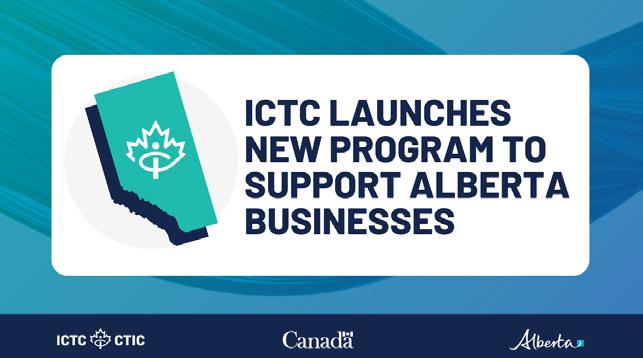
ICTC Launches New Program to Support Alberta Businesses to Attract and Retain Top Talent


ICTC received 1,781 news media mentions in 2024-2025 and contributed 22 thought leadership articles. Here are 29 highlights from the year.
Unraveling Canada's Commercialization Deficit
NATIONAL NEWSWATCH
Stittsville’s Guardian Angels students excited to compete in the esteemed national Cyber Security competition
STITTSVILLE CENTRAL
New training program to address shortage of workers in digital economy
Ontario could be North America’s electric vehicle powerhouse— but it hinges on workforce alignment
WINDSOR STAR
Seven Attributes of Effective Micro-Credential Programs
NATIONAL NEWSWATCH
Alberta Game Jam 2024 highlights the importance of game jams in the province’s interactive digital media ecosystem
DIGITAL ALBERTA
It's a field that needs more workers — and these Fredericton whiz kids have a head start
CBC How to choose a micro-credential to reach your career goals
Fredericton middle school wins at CyberTitan nationals
TELEGRAPH-JOURNAL
Interactive Digital Media Set to Contribute $169M to Alberta's GDP by 2030
CAREERWISE
EDMONTON JOURNAL
Alberta’s Interactive Digital Media Industry Set to Boost Province’s Economy by $169M by 2030
Digital Health Tools Could Help Make Our Healthcare System More Efficient, but Implementation Requires Investment in Healthcare Provider Digital Health Skills
Could New Housing Technologies Be a Pathway to Affordable Housing in Canada?
What Francophone students in Anglophone Canada want out of higher education
300 AI Leaders to Convene in Riyahd Next Week for GAIN 2024 MIDDLE EAST AI NEWS



Building An Innovation Global Capital: Catalysts for Canada’s Next Leap Forward
Canada-EU Digital Pact: Strengthening Economic Sovereignty and Global Leadership
SCIENCE POLICY: CANADA’S INNOVATION STRATEGY
Cybercrime is a 2024 intelligence priority for Canada, but one in six cybersecurity jobs go unfilled
NATIONAL NEWSWATCH
Alberta's ICT Sector Projected to Contribute $13 Billion to GDP by 2030
CALGARY HERALD Recommendations to the Pre-Budget Consultation in Advance of the 2025 Federal Budget
Alberta’s Tech Economy is Booming and Poised for Future Growth, Report Concludes
Alberta’s Expanding Tech Economy is Set to Employ a Quarter Million Workers
CALGARY.TECH
TECHTALENT.CA
ICTC’s Recommendations to Bill C-27 Consultations on CCPA, PIDPTA, and AIDA
Building a Future-Ready Canada: ICTC’s Recommendations to ESDC’s Building a Modern 21st Century Workforce Consultation
The Impacts of Emerging Technologies on the Digital Divide
INTENDED CONSEQUENCES PODCAST Quebec’s Digital Economy Could Employ a Quarter of Canada’s Tech Workers by 2030: New ICTC Report
FINANCIAL POST Strengthening Canada’s Innovation Ecosystem: ICTC’s Recommendations to ISED on a Patent Box Regime
A New Global Paradigm –Technology, Humanity, and Sustainable Progress
GLOBAL FORUM Quebec could employ a quarter of the country’s tech workers by 2030 MONEY.CA

ICTC
ICTC
ICTC
ICTC

ICTC hosted 135 virtual and in-person events in 2024-2025. Here are five highlights from the year.

ICTC’s President & CEO, Namir Anani, was joined onstage at the InCyber Forum by Estonia’s Minister of Justice and Digital Affairs, the Honourable Liisa-Li Pakosta, for a fireside chat about digital transformation for national innovation and productivity.

In partnership with Communications Security Establishment Canada (CSE), ICTC hosted a two-day summit at CSE headquarters in Ottawa where 30 young women from across Canada had the opportunity to hear from leaders in the sector avnd explore career opportunities in cybersecurity through hands-on activities.

ICTC’s CyberTitan hosted its seventh annual national competition in 2024-2025, culminating in a summit and awards ceremony for national finalists and winners. Students from across Canada heard from cybersecurity experts from Estonia, Canada’s Communications Security Establishment, Amazon Web Services Canada, Quantum Algorithms Institute, Field Effect, KPMG and Mastercard before the top prize was awarded to a student team from Old Scona Academic High School in Edmonton, AB.

ICTC launched its 5-year labour market outlook report for Alberta at a sold-out event in Calgary that included a presentation of the key findings, a panel discussion with Alberta tech industry leaders, and networking with industry, policymakers, and media.

Women Who Lead: Shaping Future Leadership in Canada’s Digital Economy
On International Women’s Day, ICTC hosted a summit in Toronto to celebrate the contributions of women to the digital economy and discuss actionable strategies for increasing the representation of women in leadership.
ICTC staff spoke at 61 high-profile events throughout the year, providing thought leadership, expertise, and insights as keynotes, panellists, and in discussions. Here are three highlights from the year.

ICTC’s President and CEO, Namir Anani, was a moderator and panelist at the 2024 Workforce Summit in Montreal, hosted by Minister of Employment, Workforce Development and Official Languages, Randy Boissonnault. The event brought together 250 thought leaders, including senior leadership from across sectors, to gather diverse views on how to foster a modern, inclusive, and productive labour market for the 21st century.

The second European Convergence Summit, hosted by the AI, Data, and Robotics Association (ADRA), convened global leaders for discussion about how AI, robotics and big data combined can help address socio-economic issues. ICTC’s President and CEO, Namir Anani, spoke on the event’s Predictive Diagnostics and Personalized Medicine panel, and the event’s Foresight 2030: ADR Convergence and Policy panel.

Hosted by the Saudi Data and Artificial Intelligence Authority, the Global AI Summit drew hundreds of global leaders to share the latest perspectives on AI, including Generative AI, AI in urban life, and the ethical governance of AI. Highlighting insights from global technology leaders and Saudi innovators, this event featured ICTC President and CEO, Namir Anani, in a panel discussion on One World, Many Perspectives: AI Governance in an Interconnected World.




In 2024–2025, ICTC’s research and policy portfolio advanced evidence-based solutions that strengthen Canada’s digital economy while addressing the interconnected challenges of innovation, equity, and sustainability. Over the past year, our 17 publications provided governments, industry, and communities with actionable intelligence—bridging policy and practice to ensure Canada remains competitive and resilient in an evolving global landscape.
Guided by ICTC’s five focus areas—Economic Growth, Sustainable Businesses, A Talented and Entrepreneurial Workforce, A Safe, Private, and Secure Environment, and An Equitable and Inclusive Economy—our research explored emerging technologies, evolving labour market needs, and systemic barriers to participation. From detailed labour market forecasts for Alberta and Quebec’s digital economies to actionable frameworks for green–digital skills development and strategies for AI governance and international collaboration, our work informed both immediate decision-making and long-term national strategies. By combining rigorous economic analysis with forward-looking policy recommendations, ICTC’s research identifies opportunities for innovation and growth while also ensuring that these opportunities are accessible, inclusive, and aligned with Canada’s economic and sustainability goals. This year’s body of work underscores our commitment to creating a digital economy where businesses thrive, talent flourishes, security is strengthened, and prosperity is shared by all.

Quebec plays a vital role in Canada’s digital economy, employing more than half a million technology workers— one-fifth of the country’s total tech workforce—and is a hub for artificial intelligence, interactive digital media, and innovation. Yet despite this strong foundation, recent trends point to challenges that could hinder future growth.



ICTC presents a six-year outlook on Alberta’s digital economy, predicting substantial growth in the ICT sector. With a digital economy driving innovation, job creation, and economic progress, Alberta is a vital contributor to economic activity in Canada. As Canada’s productivity lags behind other countries, Alberta has outpaced national productivity rates by 18%, and its ICT sector ranks among the top five most productive.

Canada and the EU each stand as leaders in distinct yet strategically compatible areas of AI development and can play a critical role in shaping the future of AI through their respective regulatory approaches, areas of expertise, and strategic partnerships.
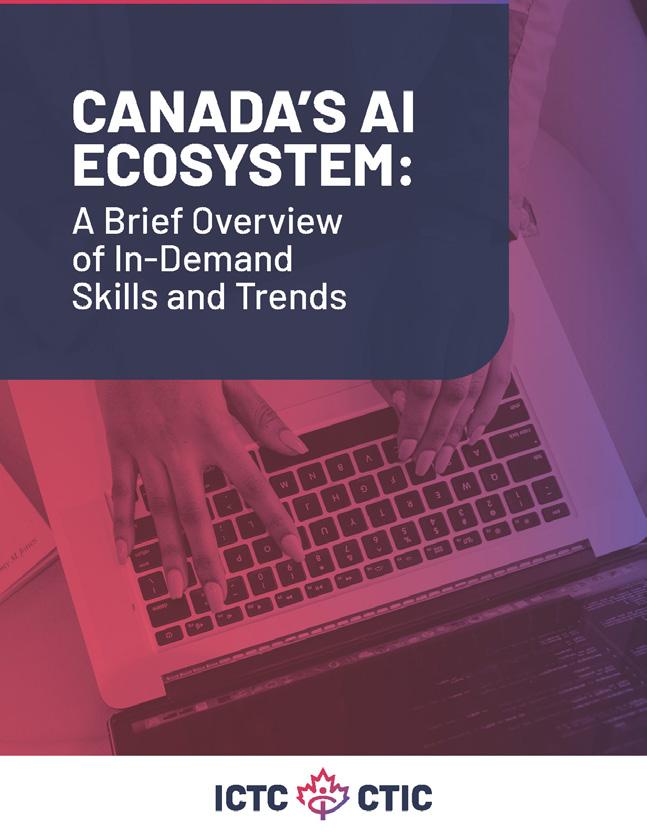
AI is transforming industries across Canada, driving demand for skilled professionals who understand the benefits of AI, and can leverage its potential. However, as AI adoption accelerates, so does the need for a workforce equipped with the necessary skills for successful use and implementation.

OF
AI is rapidly transforming the information and communications technology (ICT) sector in Canada, driving significant changes in job roles and indemand skills. As AI tools automate routine tasks and reshape workflows, there is an urgent need to equip the ICT workforce with the right skills and knowledge to thrive in this evolving landscape.



Interactive digital media (IDM) is becoming a vibrant part of Alberta’s economic fabric. ICTC research finds that Alberta’s growing IDM industry will contribute up to $169M to the province’s GDP by 2030. Alberta’s 177 studios increasingly play an important role in the province’s economy and labour market.
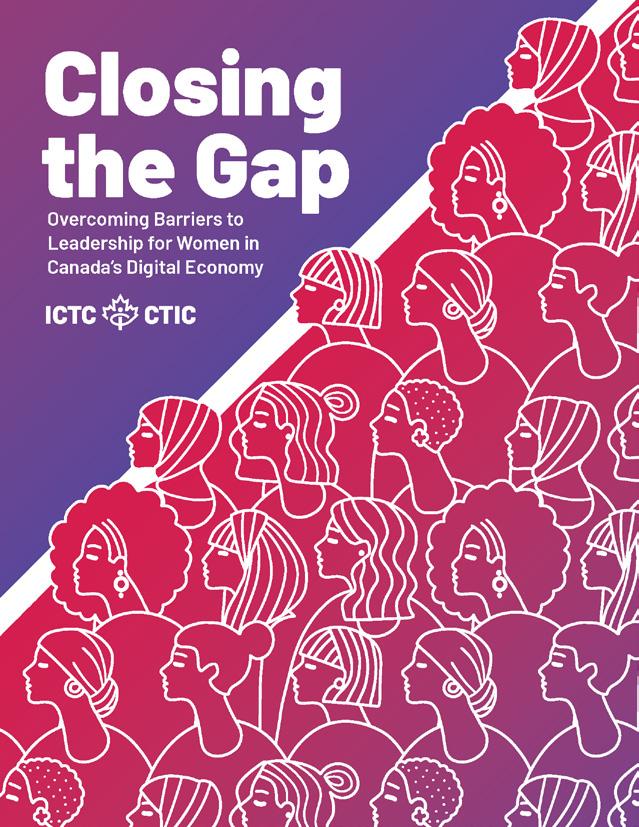
Despite growing awareness of the value of diverse leadership, women remain significantly underrepresented in senior roles across Canada’s digital economy. This leadership gap not only reflects persistent gender inequities—it also represents a missed economic opportunity.

Canada’s entrepreneurial gender gap represents a missed opportunity for job creation, innovation, and overall economic expansion. While the percentage of women-owned businesses has increased slightly in recent years, women are still underrepresented in entrepreneurship and continue to face challenges when starting and sustaining their businesses.

To improve efficiencies and environmental sustainability, Canadian supply chains are becoming more digitized, leveraging big data, artificial intelligence, advanced robotics, and the Internet of Things. This requires that supply chain professionals acquire new, in-demand digital and environmental skills alongside traditional competencies.



DRIVING SUSTAINABILITY: IN-DEMAND JOBS AND SKILLS IN CANADA’S TRANSPORTATION SECTOR
Decarbonizing Cananda’s transportation sector requires a multifaceted approach. Postsecondary institutions, microcredential providers, original equipment manufacturers, and on-the-job training will be instrumental in building the knowledge and skills of entrylevel entrants.

THE JUNCTION OF DIGITAL-GREEN SKILLS FOR THE TWIN TRANSITION: A COMPETENCY FRAMEWORK
As Canada transitions to a netzero economy, an estimated 3.1 million jobs will be disrupted (about 15% of Canada’s labour force). This report explores the specific skills needed at the intersection of the digital and green economies and offers a competency framework for digital-green skills.

Digital economy labour shortages pose a significant threat to the health of the Canadian economy. Recognizing that post-secondary graduates often lack work-ready skills, an ecosystem approach to workforce development is needed, bringing together higher education institutions, industry partners, and not-for-profits.
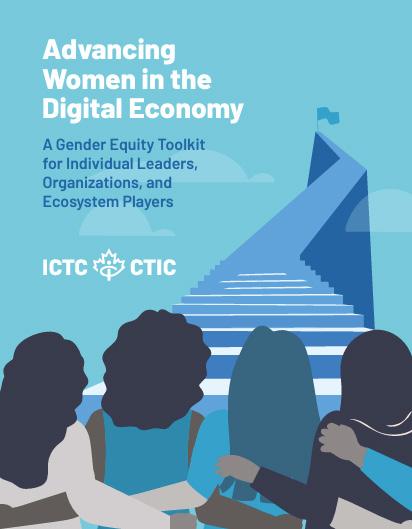
WOMEN IN THE DIGITAL ECONOMY: A GENDER EQUITY TOOLKIT FOR INDIVIDUAL LEADERS, ORGANIZATIONS, AND ECOSYSTEM
ICTC’s Gender Equity Toolkit offers calls to action to help advance the careers of women in the digital economy. Each call to action provides key concrete strategies and considerations for people, processes, and technology to affect sustainable change.


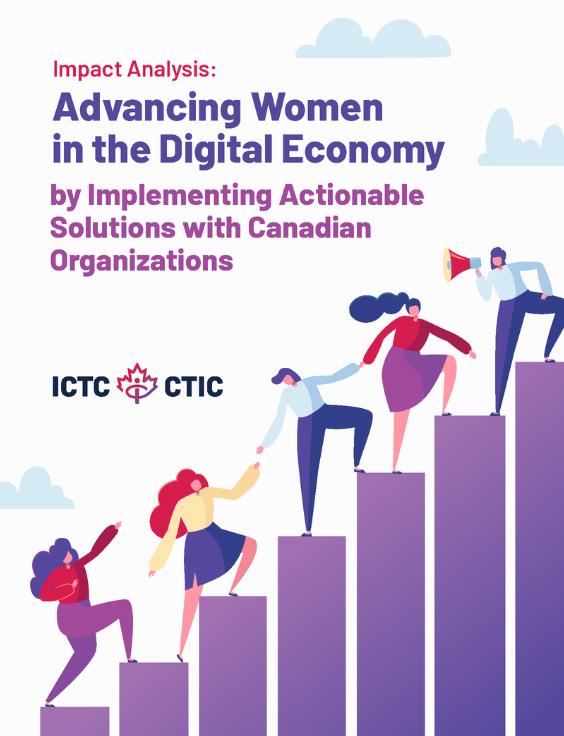
ANALYSIS: ADVANCING WOMEN IN THE DIGITAL ECONOMY BY IMPLEMENTING ACTIONABLE SOLUTIONS WITH CANADIAN ORGANIZATIONS
This report features three case studies showcasing the implementation of action items from ICTC’s Gender Equity Toolkit and their impact on the advancement of women in tech.

To achieve Nova Scotia’s ambitious targets to reach an 80% renewable energy mix by 2030 and a net-zero emissions economy by 2050, the province must leverage its existing expertise, scale skills development initiatives, and build collaborative relationships between government, industry, and the community.

Health technology innovation could ease the burden on Alberta’s health care system by improving patient access and the quality and continuity of care, but a shortage of workers with HealthTech skills means the province must also invest in workforce development.

Ontario’s rapidly developing electric vehicle industry presents enormous economic opportunities for the province and its workforce. If Ontario can align its workforce with emerging needs, the province has the potential to become a North American electric vehicle powerhouse.



ANNUAL REPORT 2024-2025
ICTC’s work is anchored in three core program pillars:
Together, they expand and diversify Canada’s talent base, strengthen workforce capabilities, and empower businesses to innovate and thrive— directly advancing ICTC’s vision to shape Canada’s digital economy and its goal of ensuring technology drives economic growth and innovation while keeping Canada’s workforce competitive on the global stage.
Underpinning all program areas is ICTC’s evidence-based approach to design and delivery. Guided by in-depth labour market research, sector analysis, industry advice, and real-time economic intelligence, ICTC ensures its programs respond to emerging trends, address critical skills gaps, and meet the evolving needs of Canadian companies. This research foundation not only informs program priorities but also ensures that every initiative is targeted, relevant, and capable of delivering a meaningful and measurable impact.


1 2 3
K-12: Introducing new and emerging technologies to elementary, middle and high school students and educators
Post-secondary students and new graduates: Bridging the education-workforce skills gap
Global talent: Accelerating the growth of Canada’s digital economy with skilled international talent
ACCELERATING BUSINESS GROWTH AND PRODUCTIVITY IN CANADA’S DIGITAL ECONOMY
Reskilling for career transitioners: Supporting professionals to transition into high-demand occupations in the digital economy
Upskilling for professionals: Equipping professionals with the skills to navigate new and emerging technologies
144,142
people supported by ICTC’s tech talent pipeline initiatives*
103,965 elementary, middle and high school students
8,601 teachers
24,233 post-secondary students
7,343 experienced international ICT professionals
41,340
people supported by ICTC’s digital skills training initiatives*
1,339 professionals supported to transition to high-demand digital economy roles
40,001 professionals equipped with new skills in advanced and emerging technologies
Talent: Connecting businesses to the talent they need for growth, transformation, and productivity
Capacity: Growing business and entrepreneurial capacity for innovation and commercialization in the digital economy
Labour market intelligence: Providing businesses and policymakers with the information and data they need for strategic decision-making
10,265
small and medium-sized businesses and entrepreneurs supported by ICTC’s business growth and productivity initiatives*
9,836 small and medium-sized businesses
429 entrepreneurs
* Since 2017
A strong, future-ready digital economy depends on a robust pipeline of skilled tech talent. ICTC’s K–12, post-secondary, and international talent initiatives address critical skills gaps, labour market shortages, and sectoral growth. Early engagement in K–12 builds foundational digital literacy, sparks interest in technology careers, and fosters diversity from the start. Post-secondary programs bridge education and the workforce, offering real-world experience, industry-recognized credentials, and pathways into high-demand fields. Targeted global talent initiatives bring experienced international professionals into the Canadian market, injecting specialized expertise and supporting immediate labour market needs. Together, these interventions expand and diversify Canada’s workforce and digital economy, strengthen innovation capacity, and secure the talent needed for long-term economic growth.
Skills and resources for K-12 educators
Learning experiences for K-12 students
Work placements for post-secondary students
Industry-informed learning experiences
Connections for international ICT professionals to Canada’s digital economy









ICTC’s kindergarten to grade 12 (K-12) programs introduce students to emerging digital skills through national competitions, educational initiatives, and resources for educators. Since 2017, ICTC’s K-12 programs have engaged over 103,965 students and 8,601 teachers, combining digital skills education, career exploration, and experiential learning both inside and outside the classroom.
Digital literacy and emerging technology skills for
ICTC’s CyberBytes initiative equips educators with the knowledge and handson skills they need to effectively incorporate emerging technologies into their classrooms and lesson plans. The program aids educators in digital literacy, digital design, and understanding emerging technologies like AI, space tech, robotics, and quantum computing so that they can prepare their students for the future with engaging and interactive classroom experiences.
ICTC provides comprehensive resources to support K-12 teachers and administrators deliver cutting-edge emerging technology programs for students. Promoting interdisciplinary, cross-curricular approaches while fulfilling mandatory education standards, ICTC has established consistent achievement benchmarks and educational outcomes, ensuring technology education nationwide is accessible to all learners and educators.

It was a pleasure to welcome ICTC for an engaging session with our students exploring the current state of quantum computing in Canada. The discussions provided valuable insights into how programs can be developed on quantum systems and inspired thoughtful questions and curiosity among learners.”
- Joel Flanagan, Teacher at Harrison Trimble High School, Moncton, New Brunswick
Canada’s largest and longest-running cybersecurity competition for students
ICTC leads CyberTitan, Canada’s largest and longest-running cybersecurity competition for middle and high school students across the country. Students learn to defend against cyber threats and explore career paths in cybersecurity, helping to build a strong future digital workforce for Canada. The program promotes inclusivity by encouraging participation from all provinces and territories and ensures representation from diverse groups, including girls, Indigenous students, and individuals with disabilities.

ICTC’s Focus on IT (FIT) and Middle Years Focus on IT (MyFIT) are nationally recognized certificate programs that provide middle and high school students with valuable pathways and practical experiences to develop their IT and digital skills. After graduation, students are encouraged to seek industry work placements and further learning opportunities.
ICTC has supported 24,233 post-secondary students develop essential on-the-job skills for Canada’s digital economy. With youth un- and under-employment reaching levels not seen since the start of the COVID-19 pandemic, investing in Canada’s youth through work-integrated learning, placement incentives, and industryinformed digital upskilling is crucial for the country’s future prosperity and its continued leadership in the global economy.
Real-world work experiences with businesses in Canada’s digital economy
ICTC’s Work-Integrated Learning Digital (WIL Digital) program supports postsecondary students by providing experiential learning opportunities. With the most in-demand jobs in Canada’s digital economy constantly evolving, including being increasingly affected by automation, education alone is no longer enough to prepare graduates for the workforce. ICTC’s work-integrated learning programs enable students to gain real-world experience with businesses in the digital economy, helping them stand out in a competitive job market and acquire the skills employers most need.
Canada’s cybersecurity workforce faces increasing demand and a talent shortfall, with one in six positions remaining vacant. Alongside a notable lack of diversity— only 20% of the workforce identifies as women—there is an urgent need to expand and diversify Canada’s cybersecurity talent pool. ICTC’s Cybersecurity Training and Work Integrated Learning (CTWIL) pilot program offers post-secondary students who identify as women or non-binary access to mentorship, training, certifications, and hands-on learning opportunities that help bridge this gap.
Participating in the ICTC WIL project has been a transformative experience for me. I earned three valuable certificates, which significantly enhanced my technical expertise. The intensive mentorship experience, which continues to provide invaluable guidance and support, has been instrumental in building my confidence and honing my skills. This empowering journey culminated in a successful three-month internship where I can practically apply and further develop my newly acquired knowledge and abilities.”
–
Michelle Boutilier, Fredericton, New Brunswick
Preparing youth for the future of work with resume-boosting online courses
ICTC’s portfolio of online learning courses, offered in partnership with leading organisations like Cisco and Microsoft, provides students with real-world, resume-enhancing experiences, certifications, and the digital skills most valued by employers. They support students participating in work-integrated learning placements to learn and earn simultaneously, ultimately helping them stand out in the job market with relevant, recognised credentials.

The courses at ICTC give a great introduction for what's to come in the future within these huge technology fields. The stuff I learned was very useful, and I really enjoyed the challenges presented in each course. Facilitators were also always available to help, which made me feel welcome even in an online setting. If you're looking to brush up your skills, or even get introduced to a certain industry, I would recommend taking ICTC's courses. They provide an easy and fast way to learn the most relevant information and can help you jump-start your career.”
– Antono Barua, Toronto, Ontario
Skilled international talent drives Canada’s economic growth. Immigrants make up 37% of Canada’s ICT workforce, and this expanding pool of global talent is essential for addressing labour shortages and boosting innovation, especially in emerging fields such as software engineers and developers, data scientists, and cybersecurity specialists. Since 2017, ICTC has helped 7,343 experienced international ICT professionals integrate into Canada’s digital economy.
Pre-arrival services: Connecting experienced international ICT professionals with Canadian employers before they arrive in Canada
ICTC’s Global Onboarding of Talent (GO Talent) program connects ICT professionals with Canadian employers before they arrive in Canada as Permanent Residents. As a part of Immigration, Refugees and Citizenship Canada (IRCC)’s pre-arrival services for internationally educated professionals, ICTC’s GO Talent offers support to professionals planning to bring their skills and experience to Canada. The program provides pre-arrival newcomers with sectorspecific support, career events, and job search assistance.

ICTC services played a crucial role in my journey to Canada by providing invaluable assistance in refining my resume and offering insightful webinars on navigating the ICT sector. The thorough review and revisions to my resume significantly enhanced its presentation, which ultimately contributed to my success in securing opportunities in Canada. Additionally, the informative webinar provided key insights into the Canadian job market, helping me better understand the landscape and effectively position myself for success. Overall, your services were instrumental in facilitating my transition to Canada, and I'm grateful for the support provided.”
– GO Talent program participant, Calgary, Alberta



In 2024–2025, ICTC advanced Canada’s digital workforce readiness through targeted reskilling and upskilling initiatives crucial to the country’s economic resilience. As global trade evolves, industries digitize, and the green transition accelerates, Canada faces both talent shortages in high-demand digital roles and widespread worker displacement due to automation and industrial change. Rapid, targeted training is essential to help workers transition into occupations that drive innovation and productivity. ICTC’s efforts have equipped thousands of professionals with sought-after digital skills, addressing critical labour market gaps and empowering Canadians to remain competitive, adaptable, and ready to lead in an increasingly digital economy.
EXPLORE HOW ICTC IS:
Rapidly reskilling professionals into high-demand digital occupations
Ensuring Canada’s business leaders are AI-ready
ICTC’s 2024-2025 work to equip Canada’s workforce with in-demand digital skills was supported by:



Rapid reskilling into high-demand digital jobs is more critical than ever as Canada navigates economic shifts, digital transformation, and labour market restructuring. Workers displaced by automation and changing industries need quick, targeted training to move into high-demand roles. Since 2019, ICTC has supported 1,339 career transitioners to reskill into high-demand roles in the digital economy.
CTC’s rapid reskilling model allows for highly responsive workforce interventions that make critical industry-led adjustments to labour market supply and demand. In 2024-2025, ICTC’s Beyond the Cloud initiative, supported by Upskill Canada (powered by Palette Skills), addressed an urgent demand for digital infrastructure talent by swiftly reskilling mid-career ICT professionals and assisting employers to upskill their existing staff. Through flexible training, job placement support, and data-driven methods to identify and fill skills gaps, over 600 professionals across Canada were helped to reskill into high-demand digital infrastructure roles such as cloud engineering, database administration, and DevOps.

The technology space is changing fast, and as a software engineer, I understand the importance of upskilling. ICTC helped me not only to grow my skills but also to develop my network. The industry capstone projects helped us apply the technical and soft skills we learn during the program by helping a business solve a specific problem.”
– Tina Pham, Toronto, Ontario
In today’s fast-changing digital economy, Canadian professionals need to be able to navigate new and emerging technologies to stay competitive and foster innovation. For business leaders, understanding artificial intelligence is essential for making informed strategic decisions, increasing efficiencies, and promoting growth. Recognizing this, ICTC has provided AI upskilling to 40,001 business leaders across Canada, empowering them to use AI effectively during this era of digital transformation.
intelligence
ICTC’s Generative AI for Business Leaders initiative is ensuring that Canadian professionals across all sectors have the skills they need to harness AI for productivity, innovation, and growth. With Generative AI projected to save workers up to 125 hours per year, Canada could see an 8% increase in productivity and add $187 billion annually to the economy by 2030. However, only 37% of workers say their organization provides training on how to use AI. Upskilling to make sure Canada’s business leaders are AI-ready is a crucial step to closing this gap.

Canada’s digital economy thrives on two key drivers: talent and capacity. Businesses and entrepreneurs need access to the right people—skilled, adaptable talent that can fuel growth, scale, and productivity. For many small and medium-sized businesses and start-ups, developing these strengths can be challenging due to skills gaps, limited training, and scarce resources. ICTC helps overcome these challenges by connecting employers with top digital talent and providing the tools, insights, and support needed to build capacity for innovation and long-term success. Together, these efforts enable Canadian businesses and entrepreneurs to improve productivity, expand, and lead in the digital economy.
Providing access to digital talent that fuels growth
Supporting businesses to invest in employee development for innovation and productivity
Equipping businesses with the capacity to retain top ICT talent
Accelerating entrepreneurship for economic growth
Providing tools, information and resources to help businesses succeed in the digital economy
2024-2025 work to accelerate inclusive business growth and productivity in Canada’s digital economy was supported by:








Canada’s digital economy relies on talent—and currently, the shortage is holding businesses back. A growing digital skills gap is impeding innovation and competitiveness. The solution is twofold: connect employers with in-demand talent and enable them to upskill and reskill their teams, building the capabilities that drive productivity, growth, and long-term success. Since 2017, ICTC has helped 9,836 small and medium-sized businesses access the skilled talent needed for growth, scale, and productivity. .
Connecting employers to top student talent
Through WIL Digital and CTWIL programs, ICTC empowers businesses to accelerate growth and productivity within Canada’s digital economy by connecting them with top emerging talent. Wage-subsidized placements provide employers immediate access to students whose fresh perspectives, advanced digital skills, and innovative thinking help address urgent challenges, drive digital transformation, and create new opportunities for expansion.
Injecting industries with specialized expertise through global talent
Through ICTC’s global talent initiatives, Canadian employers gain pre-arrival access to internationally educated ICT professionals—connecting businesses with highly skilled, job ready digital talent even before they arrive in Canada. Complementing this, post-arrival programming links employers to newcomers already settled in Canada, offering streamlined access to pre-screened, highly skilled ICT talent.

Students invigorate the year-round full-time employees. If you've been working for 25 years and you have engineering students that join you that are ultra comfortable with computer applications or the new best thing –they bring different experiences and perspectives, and they invigorate the organization as a whole."
– Jeff Lenehan, Founder of JIL Engineering, New Brunswick
Unlocking employee talent through upskilling
Despite the clear link between skills investment and innovation, Canada has lagged in employer-sponsored training. ICTC’s upskilling model supports businesses invest in employee development by recommending existing staff for personalized training tailored to their needs. The result is a significant boost to innovation, growth, and productivity in Canada’s digital economy.
As a growing technology company, one of our team members participated in ICTC's program and successfully completed advanced training in key areas such as cybersecurity and Gen AI applications. This engagement has supported our internal capacity development and aligned well with our broader commitment to innovation and technical excellence. Programs like this provide companies like ours with access to relevant, industry-aligned training for mid-career professionals — helping to strengthen Canada’s innovation economy.”
– Nurul Ibrahim, CEO, Atlantiq AI, Newfoundland
Advancing women in leadership for a competitive advantage
Research shows that diverse leadership improves organizational agility and competitive edge—yet women make up only 34.8% of employment in Canada’s digital economy, with even fewer in leadership roles. ICTC’s Advancing Women’s Leadership in Canada’s Digital Economy program helps businesses grow, innovate, and increase productivity by diversifying their leadership teams, accelerating the hiring and promotion of diverse talent and encouraging inclusive innovation in Canada’s digital economy.

Canadian small and medium-sized businesses face significant capacity challenges in adopting digital technologies. ICTC addresses these needs through programs that connect businesses to top ICT talent; initiatives and tools that strengthen business and entrepreneurial capacity, foster innovation, and support commercialization; and labour market intelligence that enables informed decision-making in a rapidly changing environment. Since 2019, ICTC has supported 10,265 small and medium-sized businesses and entrepreneurs to build their capacity for growth and innovation.
Empowering Alberta businesses to compete, grow, and keep top digital talent
As Alberta’s digital economy expands, employers report that nearly 60% experience retention issues, and half face recruitment challenges. ICTC’s Digital Workforce Catalyst Alberta (DWCA) program tackles a key challenge in Alberta’s growing digital economy: the ongoing loss of skilled ICT talent to other provinces. ICTC supports Alberta businesses with practical, expert-led tools and curated resources on recruitment, staff retention, organizational culture, leadership, DEI, and digital transformation—enhancing businesses’ ability to retain top ICT talent, increase productivity, and support sustainable growth in Alberta’s digital economy.
Digital Workforce Catalyst Alberta is a crucial investment to help our business community thrive, addressing challenges throughout the employee journey from recruitment to retention. We’re dedicated to making Alberta the best place in Canada to live, work, invest, and grow a business. Initiatives like this reinforce our commitment to creating a vibrant business environment.”
– The Honourable Matt Jones, Minister of Jobs, Economy, and Trade, Government of Alberta

ICTC’s entrepreneurship initiatives identify and support emerging innovators with the vision and drive to create new digital economy businesses. ICTC’s Changing the Narrative program identifies and accelerates emerging women-led enterprises in Canada’s digital economy. Offering mentorship from experienced leaders, knowledge-sharing, networking, and pitch events, the initiative empowers women entrepreneurs to launch ventures that both create talent demand and enrich Canada’s digital economy.
To thrive in an environment shaped by rapid technological change, businesses need tools, insights and supports that enable growth and innovation. Through its portfolio of smart tools, interactive business assessments, and labour market intelligence, ICTC empowers enterprises to strengthen productivity, enhance sustainability, and make strategic decisions. ICTC also supports policymakers with the data and insights they need about Canada’s digital economy to better invest in growth, business support, and workforce development.
Smart tools for business capacity and growth
Canada’s long-term economic growth relies on a strong, adaptable business sector capable of innovating, solving problems, and responding to rapid technological changes. ICTC’s interactive tools for businesses provide employers with useful data and customised guidance to enhance diversity and inclusion, environmental sustainability, leadership effectiveness, and workforce planning. By helping businesses learn, adapt, create, and solve problems, these tools directly support growth and productivity, ensuring Canadian enterprises stay competitive in a rapidly changing global economy.
Explore ICTC’s interactive tools for businesses:
Gender Equity in the Digital Economy: Generate a Business Strategy
Sustainable ICT: Create a Plan to Design, Develop and Manage ICTs Sustainably in Your Business
Equitable Leadership: Evaluate Your Organization’s Leadership Structure
Skills Mapping: Explore Skills in Demand

Labour market intelligence: Data-driven insights for business, industry, and policymakers
In Canada’s rapidly changing digital economy, access to timely and accurate labour market information is crucial for growth and competitiveness. ICTC’s labour market resources equip stakeholders with the information and data they need to learn, adjust, and resolve issues in real-time. These tools offer vital information on employment trends, emerging skill needs, and sectorspecific developments, enabling stakeholders to make informed decisions about recruitment, retention, training, investments, and strategic planning. By transforming complex labour market dynamics into practical knowledge, ICTC helps Canada strengthen its digital economy and compete in a rapidly evolving digital landscape.
Explore data and information about Canada’s digital economy:
Digital Economy Employment Dashboard
Labour Market Research and Insights
productivity. Students often stay for multiple terms, reducing training costs while building institutional knowledge.

The idea hit during one of the worst moments imaginable. SimplyCast founder Saeed El-Darahali was serving in the Canadian military when he got deployed to assess the 1998 Swiss Air crash – and quickly realized something was terribly wrong with how emergency teams were trying to communicate. He realized there weren't any cohesive communication tools for emergency response. So he decided to create them.
Fast-forward to today, and that crisis has become the foundation for a Nova Scotia-based company that's hired 39 students through ICTC’s WIL Digital program and built what might be one of Atlantic Canada's most comprehensive marketing platforms.
The company's partnership with ICTC has been integral to this expansion. Students don't just handle routine tasks – they drive core product development work that directly impacts SimplyCast's competitive position.
Students bring insights the full-time staff might miss. A student from Congo develops use cases for African markets. Former pre-med students contribute healthcare-focused templates. When targeting universities, students suggest SMS over email because it's "quick and on the go.” "We're not just giving them experience, but also getting input from them," El-Darahali says. "It's reciprocal –they're giving us value as well."
This diversity translates directly into business results. SimplyCast can now serve clients across different regions, industries, and demographics—expansion that would have been much more expensive using traditional market research and product development approaches.
The ICTC partnership has enabled SimplyCast to scale beyond normal resource constraints. They've optimized their structure around approximately three students per manager, creating efficient supervision while maximizing
The results speak for themselves. SimplyCast has grown from emergency communication concept to comprehensive marketing platform serving provincial governments and private clients across multiple sectors. Students who graduate often list their SimplyCast experience prominently on resumes, demonstrating the quality of training they receive. Some students transition to full-time roles after graduation, creating a talent pipeline that reduces recruitment costs while ensuring cultural fit. Others bring their SimplyCast experience to other companies, extending the program's economic impact across Atlantic Canada's tech sector.
What started with a military officer witnessing communication failures during a national tragedy has become a case study in how ICTC partnerships can drive both business growth and employment opportunities, proving that strategic student engagement creates genuine competitive advantages.
The ICTC partnership has enabled SimplyCast to scale beyond normal resource constraints. They've optimized their structure around approximately three students per manager, creating efficient supervision while maximizing productivity. Students often stay for multiple terms, reducing training costs while building institutional knowledge.
Read more: SimplyCast Partners with ICTC to Fuel the Future of Canada’s Digital Workforce


Asenion (formerly Fairly AI), a Canadian AI startup in the Vector Institute’s FastLane Community, has embraced student talent as a key driver of its innovation and growth. Through ICTC’s partnership with the Vector Institute, the company has access to a pipeline of highly skilled, research-oriented students who contribute real value from day one.
“We’re a startup, so there’s always more to do than our internal resources can handle,” explains Fion Lee-Madan, Technical Co-Founder and Head of Strategic Partnerships at Asenion. “Students helped us tackle projects we would’ve otherwise deprioritized, many of which directly supported our commercialization roadmap.”
These students offer more than just technical support. “There’s often a two-way learning exchange,” says Fion. “While we train them on our project management and processes, they bring fresh perspectives, domain-specific expertise, and research insights that elevate our whole team’s capabilities.”
Over the years, Asenion has hired more than 15 work-integrated learning students, with several transitioning into permanent roles. “They already understand our systems by the time they graduate. There’s no ramp-up required,” she adds.
For students, the value is just as significant. Many come to startups like Asenion because they aspire to launch ventures of their own. The hands-on exposure to real-world AI challenges and startup dynamics gives them a unique edge.
“They’re smart, entrepreneurial, and ready to work,” says Fion. “We don’t teach
For Asenion, students hired into workintegrated learning placements have provided the bandwidth, technical insight, and innovative boost needed to bring ideas from concept to market faster—ultimately strengthening the company’s commercialization efforts in the competitive AI landscape.

them AI from the ground up—they already bring that. What we give them is the chance to apply it meaningfully in a real product context.”
For Asenion, students hired into work-integrated learning placements have provided the bandwidth, technical insight, and innovative boost needed to bring ideas from concept to market faster—ultimately strengthening the company’s commercialization efforts in the competitive AI landscape.
Read more: ICTC and Vector Institute Partner to Accelerate Canada’s AI Talent Pipeline



• ACE-WIL
• Accelerate Okanagan
• Aisha Group
• Alethea Health
• Association Edteq
• Arista Cyber Technologies
• Amazon Web Services (AWS)
• Ampere
• Authentic Education Consulting
• B4Brand
• Black Community Resource Centre
• Black Founders Network
• Blue Marble Academy
• Bow Valley College
• British Columbia Institute of Technology (BCIT)
• Canada Startup Association
• Canadian Women’s Chamber of Commerce
• Calgary Economic Development
• Carleton University
• Cégep Garneau
• Centre of Excellence for Digital Innovation
• Centres of Excellence New Brunswick
• Centre Wellington District High School
• Centre for Ocean Ventures & Entrepreneurship (COVE)
• ChatterHigh
• Cisco
• City of Toronto




• C-Core
• CGI
• City of Mississauga
• CiviConnect
• Clean Foundation
• CMC Microsystems
• Cognizant
• COVE
• Collège Boréal
• Collège catholique Samuel-Genest
• Concordia University
• Conseil de l'innovation du Québec
• Coursera
• CryptoChicks
• Cyber Security Canada
• CyberLegends
• CyberStart
• Dalhousie University
• Développement économique de l’agglomération de Longueuil
• DigiBC
• Digital Alberta
• Digital Supercluster
• Downtown Niagara Falls Business Improvement Area
• Earl Haig Secondary School
• EC Council
• École secondaire catholique Marie-Rivier
• École secondaire De Lamothe-Cadillac
• École secondaire Jeunes Sans Frontières
• École secondaire publique Omer Deslauriers
• École secondaire Sainte Famille
• EMILI Canada
• Entreprendre ici
• Esplanade
• Evergreen Canada
• Excellence in Manufacturing Consortium (EMC)
• Fair Choice Learning
• Fédération des gens d’affaires d l’Ontario
• Flat Bay Band
• Field Effect
• First Nations Technology Council
• Future New Brunswick
• Genoa Design
• Government of Alberta
• Groupe 3737

• Haltech Regional Innovation Centre
• HCL Technologies
• Women in Cybersecurity (WiCyS)
• Ignite Atlantic
• Indigenous Friends Association
• Interactive Ontario
• InspireTech
• Joint Economic Development Initiative (JEDI)
• Kelowna Chamber of Commerce
• Keyin College + Learning Labs
• KPMG
• Knowledge Flow
• La Chambre d’affaires des Femmes Entreprenures et d’Industries (CAFEMI)
• La French Tech Toronto
• Lambton College
• Life Sciences Nova Scotia
• Logics Academy
• McAdam Middle School
• McGill University: Software Engineering Department
• McKenna Institute
• Microserve Ltd.
• Microsoft Canada
• Mila – Quebec Artificial Intelligence Institute
• Mount Royal Continuing Education
• NCR Canada Corp.
• New Brunswick Community College
• New Brunswick Department of Education and Early Childhood Development
• New Ventures BC Society
• NineIrons Solutions Inc.
• Nova Scotia Community College
• Ontario Bioscience
Innovation Organization
• Oceans Advance
• Old Scona Academic High School
• One North End
• PCL Industrial Management Inc.
• PEI IT Alliance
• Pembina Trails Early College
• Pinnguaq Iqaluit Makerspace
• Planet Hatch
• Platform Calgary
• Plato
• Prince George Chamber of Commerce
• Protexxa
• Propulsion Québec
• Quantum Algorithms Institute
• Queen's University
• Red River College Polytech
• Riipen
• Rogers Cybersecure Catalyst
• Science North
• Southern Alberta Institute of Technology (SAIT)
• Saurus Consulting
• Sikumiut Environmental Management (SEM)
• Siler High School
• SimplyCast
• Skills Samurai
• Solace Technologies
• Sophos Ltd.
• Startup Canada
• Students on Ice Foundation (SOI)
• Teck Resources
• Technovation Montreal
• Toronto Metropolitan University
• Toronto District School Board
• Tribe Network
• Université de l'Ontario Français
• University of Calgary
• University of New Brunswick
• University of Ottawa
• University of Waterloo
• Upskill Canada, Powered by Palette Skills
• Vector Institute
• Vehicle Transportation Innovation Centre
• Walmart Foundation
• William Lyon Mackenzie Collegiate Institute
• Women in Communications and Technology
• Women in Resource Development Corporation
• World Skills Employment Centre
• YMCA of Greater Toronto

NAMIR ANANI President and CEO

LISSA MATYAS Vice President, Capacity Building & Innovation

D’ANDRE WILSON-IHEJIRIKA
Senior Director, Program Design

IMAN YAHYAIE Senior Director, Industry and Ecosystem Engagement

CAMIRAND Chief Financial Officer

SASHIE STEENSTRA Director, Workforce Solutions

ANNE PATTERSON Chief Research and Communications Officer

CAMELIA MESTECANEAN Director, Operations

LISA WOLFGRAM
Executive Support & Stakeholder Engagement


CHAIR
JANET LIN
Senior Vice President and Chief Information Officer – EQ Bank
GARY DAVENPORT
Past President –CIO Association of Canada
VICE CHAIR
DR. THOMAS P. KEENAN, FCIPS, ICD.D, I.S.P., ITCP
Professor - University of Calgary
TREASURER
JACK NOPPÉ
Strategic Advisor – Connected Canadians
SECRETARY
JAMES HINTON
Founder, Lawyer, IP Strategist, Patent & Trademark Agent
JAUVONNE KITTO
Co-Founder & CEO – Saa Dene Group of Companies
SOUMEN ROY
Executive Director & Country Head, Canada –Tata Consultancy Services
NATIEA VINSON
National Technology CEO – First Nations Technology Council